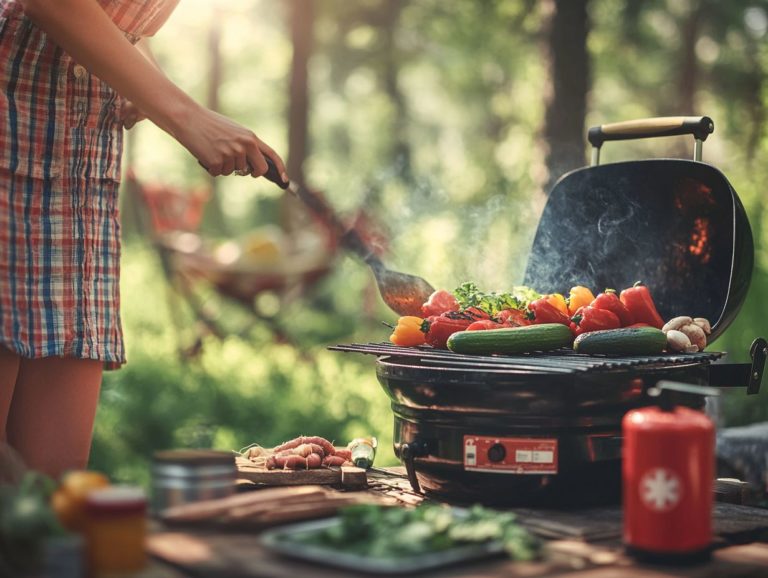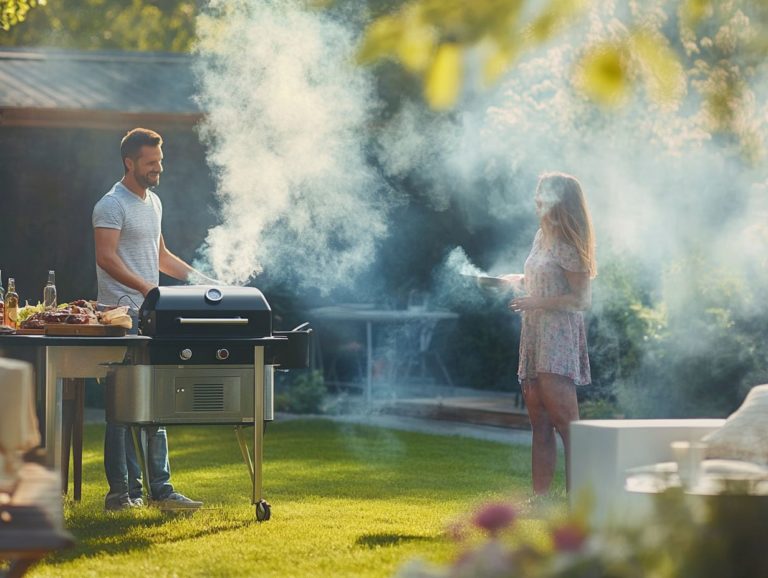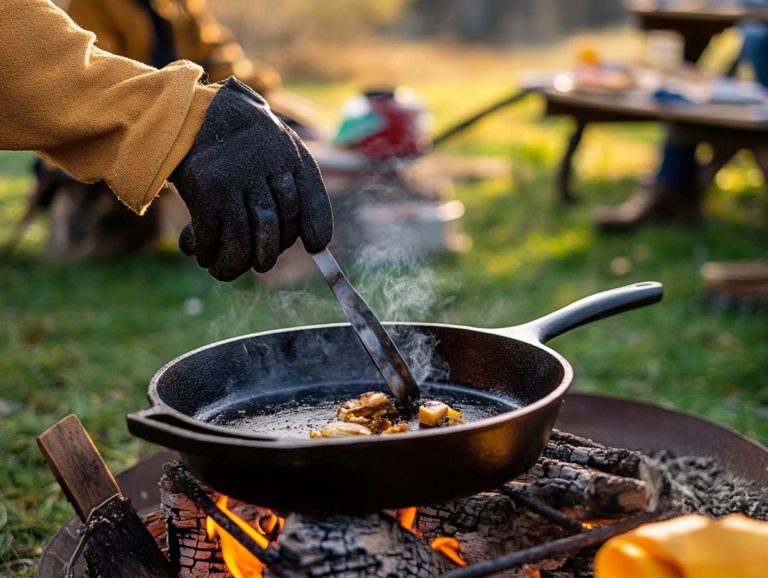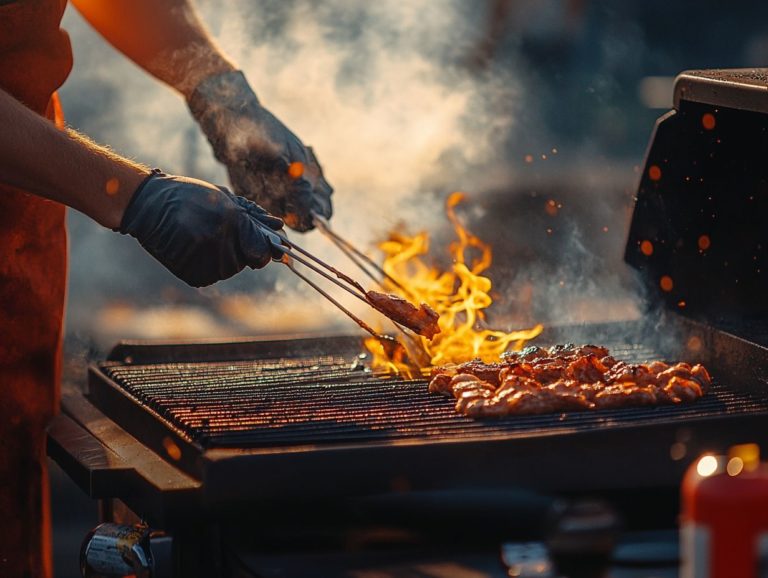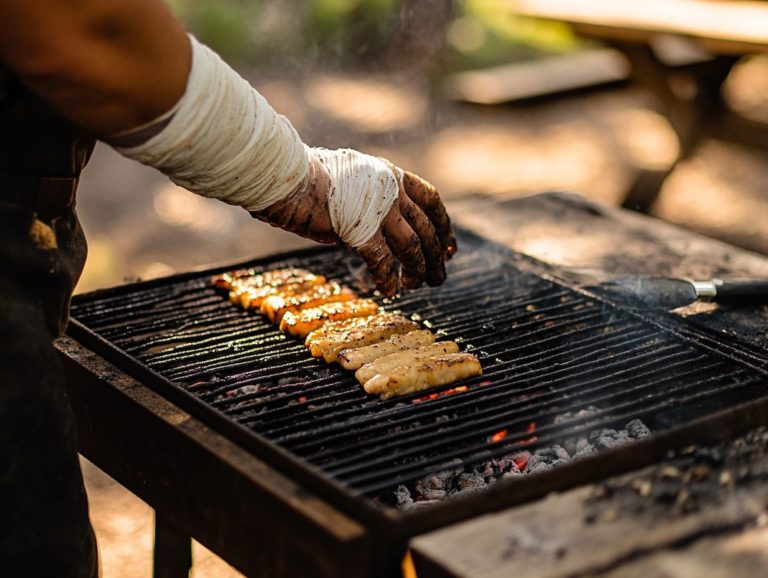How to Safely Store Food While Camping
Heading out into the great outdoors is an exhilarating adventure. However, ensuring your food remains safe and fresh is crucial for a successful camping trip.
Proper food storage preserves the quality of your meals and helps you avoid foodborne illnesses.
From choosing easy-to-store foods to mastering preparation techniques, understanding how to handle various types of food can elevate your camping experience.
This article explores effective storage options and offers tips for managing leftovers. Get ready to enjoy delicious and safe meals in nature!
Contents
- Key Takeaways:
- Importance of Proper Food Storage while Camping
- Types of Food to Bring on a Camping Trip
- Preparing Food for Camping
- Best Ways to Store Different Types of Food
- Tips for Keeping Food Fresh while Camping
- Dealing with Leftovers and Waste
- Frequently Asked Questions
- What is the best way to store food while camping?
- Do I need to keep my food in the cooler at all times to ensure food safety?
- How can I keep my food from getting wet in the cooler while following camping regulations?
- What precautions should I take to prevent food waste and spoiling while camping?
- Can I store food in my tent while camping, considering wildlife safety?
- How often should I check and replenish ice in my cooler to maintain safe food storage?
Key Takeaways:
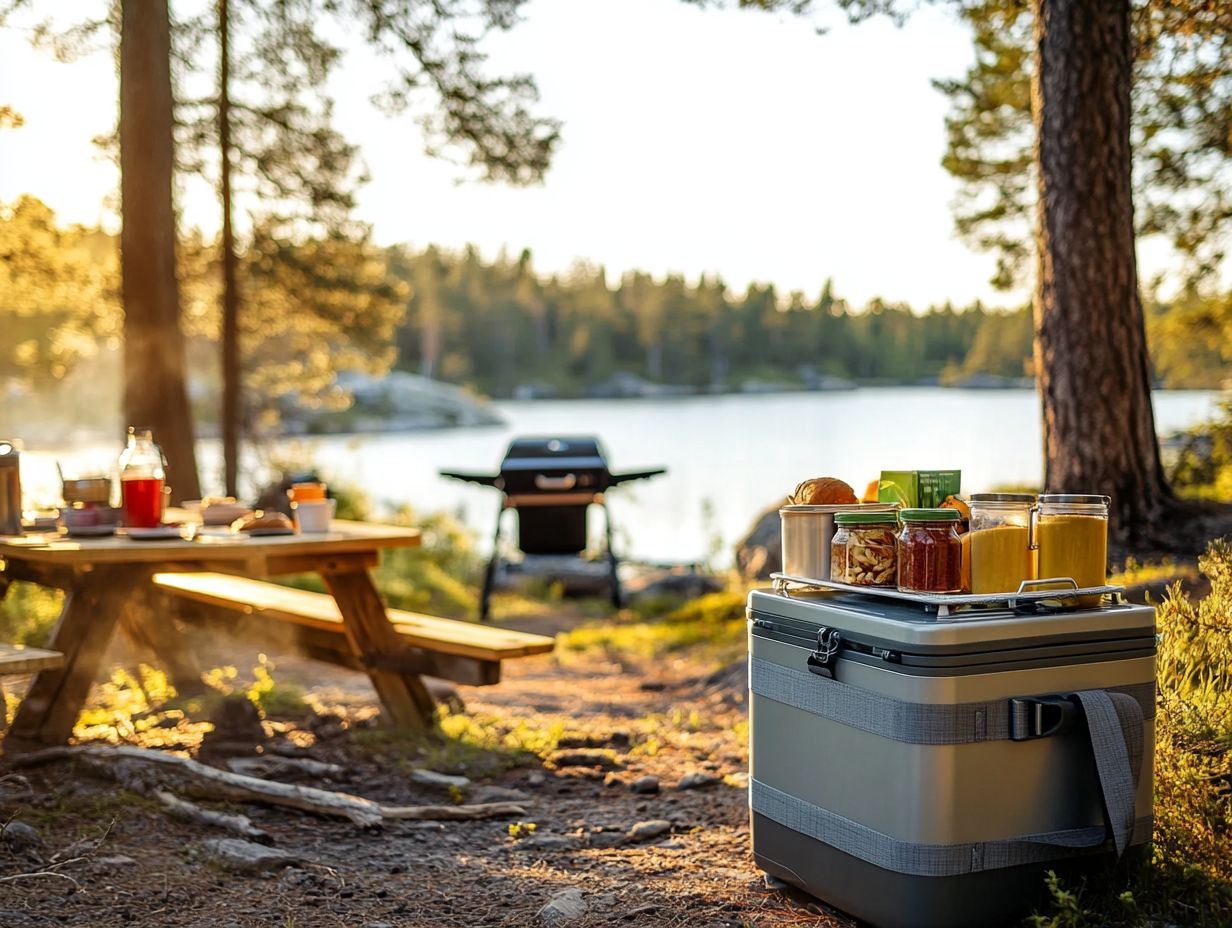
- Proper food storage is crucial while camping to maintain quality and safety.
- Bring foods that are easy to store, such as non-perishables and pre-packaged items.
- Food preparation techniques and coolers are key to keeping food fresh while camping.
Importance of Proper Food Storage while Camping
Proper food storage during your camping adventures is essential. This is especially true in bear country, where mishandling food can lead to dangerous encounters. It’s important to be aware of recognizing signs of food spoilage while camping to keep your meals safe.
It’s vital to grasp the significance of following camping regulations and employing suitable food storage solutions, like bear canisters and food lockers. These measures safeguard your provisions and protect local wildlife, especially bears and other critters.
Effective food storage also helps reduce waste and ensures that your foods that spoil easily remain fresh and enjoyable throughout your trip.
Preserving Food Quality and Safety
Preserving food quality and safety during your camping adventures benefits both your health and the environment. This is particularly important in areas where bears and wildlife roam.
By employing proper food handling and storage techniques, you can significantly minimize the risk of foodborne illness and contamination, which can be harmful to you and delicate ecosystems. Utilize airtight containers for snacks and meals, keep perishables in well-insulated coolers filled with ice, and adhere to temperature guidelines to prevent spoilage.
Make it a habit to regularly check your items for freshness. Properly discard any expired goods or those showing signs of spoilage. Simple food safety tips, like washing your hands before meal prep and using separate cutting boards for raw and cooked foods, can prevent cross-contamination, which happens when raw foods touch cooked foods. These practices will ensure your outdoor experience is healthy and enjoyable.
Types of Food to Bring on a Camping Trip
Choosing the right types of food for your camping trip can significantly elevate your outdoor adventure. By carefully selecting your supplies, you ensure that you have enough to keep you energized while also adhering to essential food safety guidelines for a worry-free experience.
Choosing Foods that are Easy to Store
When planning your camping trip, choosing foods that are easy to store streamlines your preparation and minimizes the risk of food scraps attracting unwanted wildlife, especially bears.
Opting for non-perishable items like nuts, dried fruits, and vacuum-sealed meals eases your packing process, ensuring you have nutritious options readily available without the headache of refrigeration. Incorporating freeze-dried foods offers a lightweight, space-saving alternative that requires nothing more than boiling water for quick preparation.
To maximize your storage efficiency, use portable containers made of sturdy materials such as BPA-free plastic or stainless steel. These help keep your food organized. Bear-proof canisters can further enhance your safety against curious animals.
These strategies elevate your camping experience and contribute to responsible wilderness practices.
Preparing Food for Camping
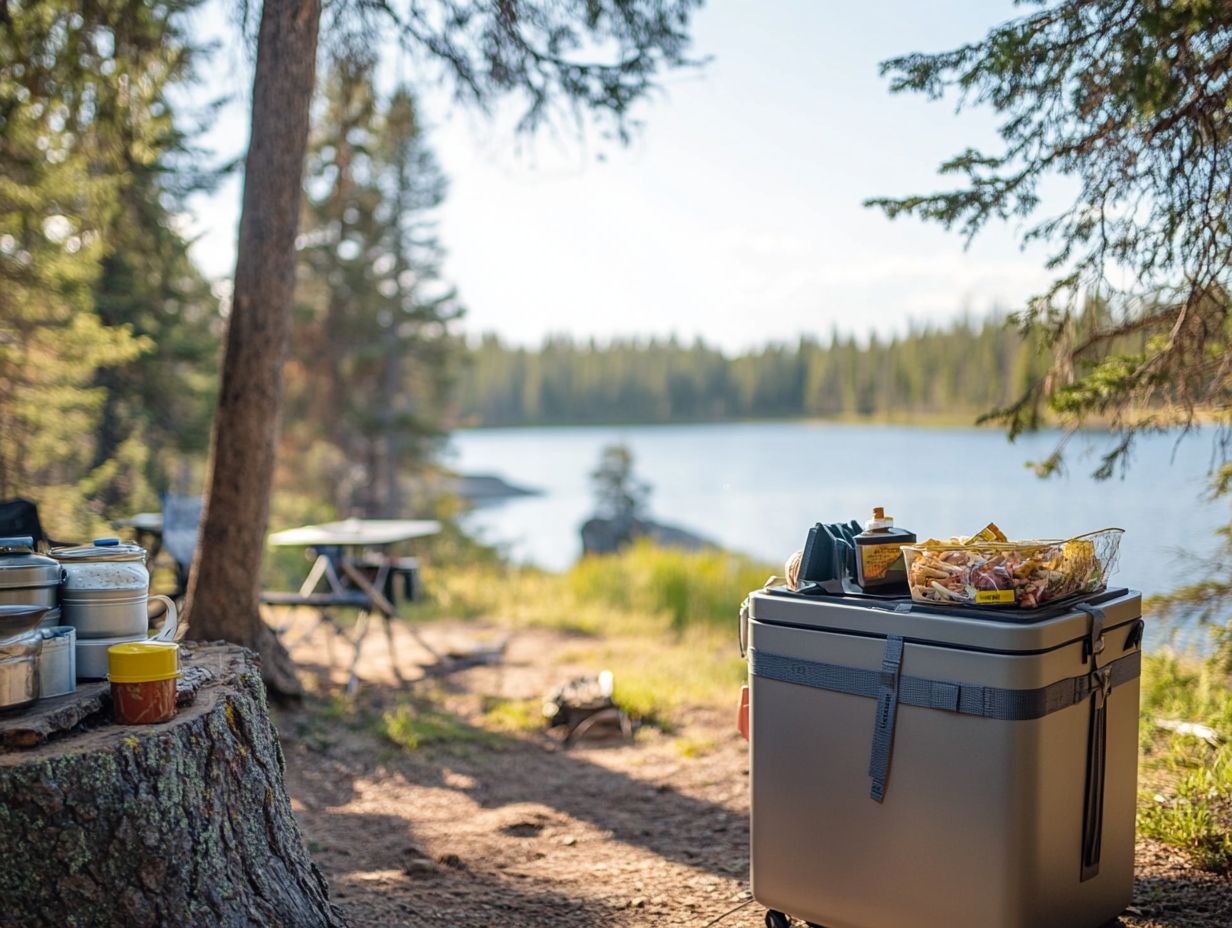
Effective food preparation for camping is essential to guarantee that your meals are delicious, safe, and manageable. By employing proper food handling techniques, you ensure that your camping food remains free from contamination, allowing you to savor every bite without worry.
Don’t wait! Act now to ensure a safe camping experience. Share your own camping food tips or experiences, and make your next trip unforgettable!
Proper Food Preparation Techniques
Using proper food preparation techniques is essential for keeping your camping meals safe and enjoyable.
Strategies like marinating, pre-cooking, and careful packing can elevate your outdoor cooking experience and minimize foodborne illnesses.
Marinating meats enhances flavor and tenderness, making meals delightful under the stars.
Pre-cooking dishes allows for quicker preparation at the campsite, giving you more time to enjoy nature.
Packing food in airtight containers reduces spoilage and contamination risks.
Keep perishables chilled and practice mindful food handling to cut down on waste.
Best Ways to Store Different Types of Food
Understanding how to store various types of food is crucial for keeping track of your food during your camping adventures, especially in bear country.
Storing Perishable and Non-Perishable Foods
Properly storing both perishable and non-perishable foods is vital for food safety and minimizing waste.
Perishable foods like meats and dairy need refrigeration and should be kept in coolers that keep food cold with ice packs.
Non-perishable items, such as canned goods and dried fruits, can be stored in a cool, dry space without worry.
Seal perishable items in airtight containers and regularly check temperatures to maintain freshness.
Using the right storage methods not only reduces spoilage but also enhances meal quality.
Tips for Keeping Food Fresh while Camping
Maintaining food freshness while camping requires smart methods.
Implement effective food storage techniques and use high-quality coolers to preserve your supplies.
Mastering Coolers and Other Techniques
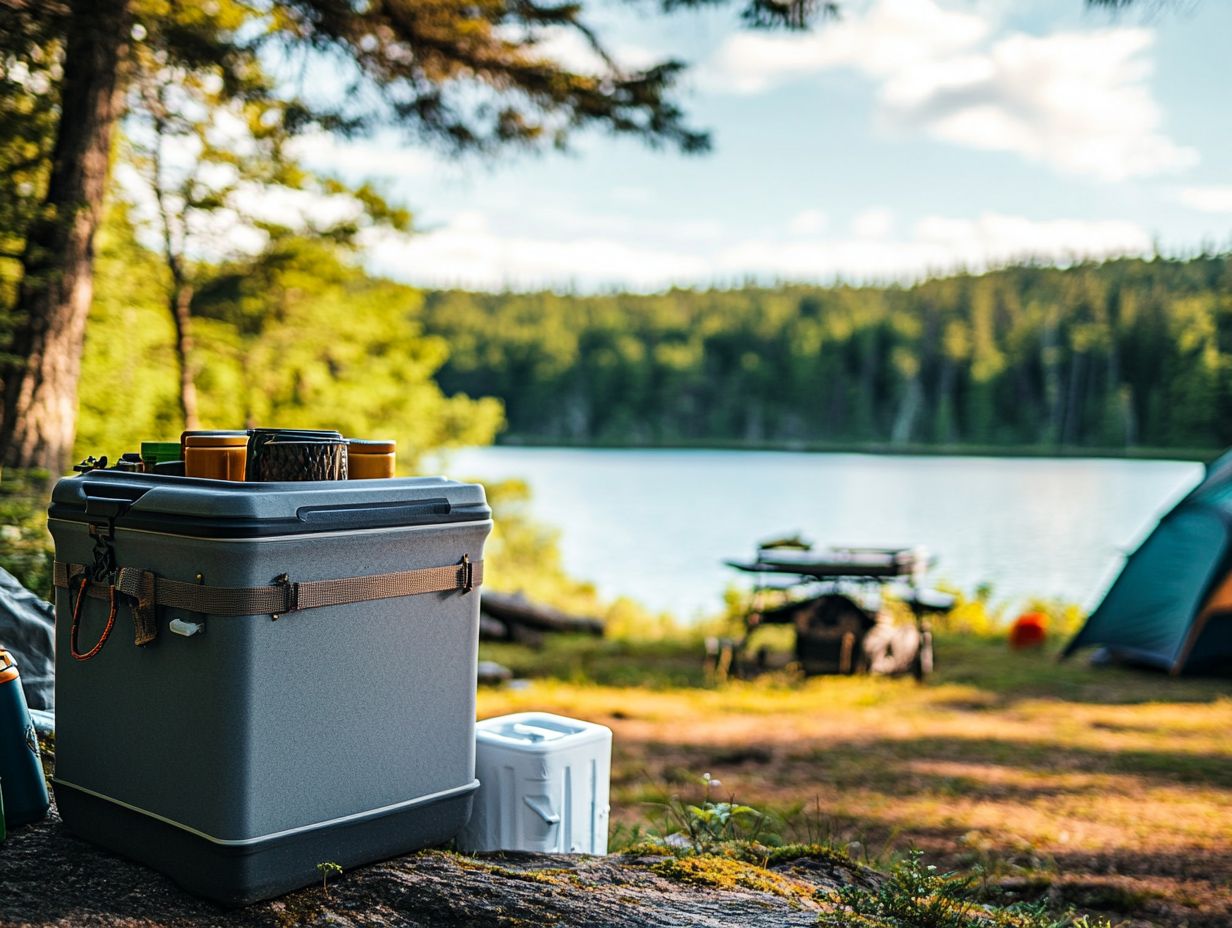
Mastering your cooler is key to keeping your food safe and fresh, especially for perishables.
Choose the right cooler since different designs offer varying levels of insulation and portability.
Layer ice packs at the bottom and use containers to separate items for better cooling efficiency.
Seal your cooler tightly to reduce warm air exposure and maintain food quality.
Opt for gel ice packs instead of loose ice to minimize mess and keep temperatures steady.
By following these practices, you can ensure your meals stay fresh and safe throughout your adventure.
Dealing with Leftovers and Waste
Managing leftovers and waste is crucial during camping.
This not only keeps your campsite clean but also reduces your environmental footprint.
Effectively handling food scraps shows your commitment to nature and enhances your overall camping experience.
Proper Disposal and Clean-Up Methods
Proper disposal and clean-up methods are essential. They help maintain campsite regulations and prevent food waste from attracting bears and other wildlife.
After enjoying a meal outdoors, you must clean up thoroughly to prevent unwanted animal visitors. Pack out all food scraps in sealed bags and utilize designated waste disposal areas to manage waste that decomposes naturally and waste that does not decompose responsibly.
Using containers that wildlife cannot break into for leftovers is crucial. Ensuring that all trash is disposed of properly minimizes wildlife encounters.
By being conscientious about waste management, you help protect our beautiful outdoors and enhance your camping experience.
Frequently Asked Questions
What is the best way to store food while camping?
The best way to store food while camping is to use airtight containers or coolers. These will help keep your food fresh and protect it from pests.
Do I need to keep my food in the cooler at all times to ensure food safety?
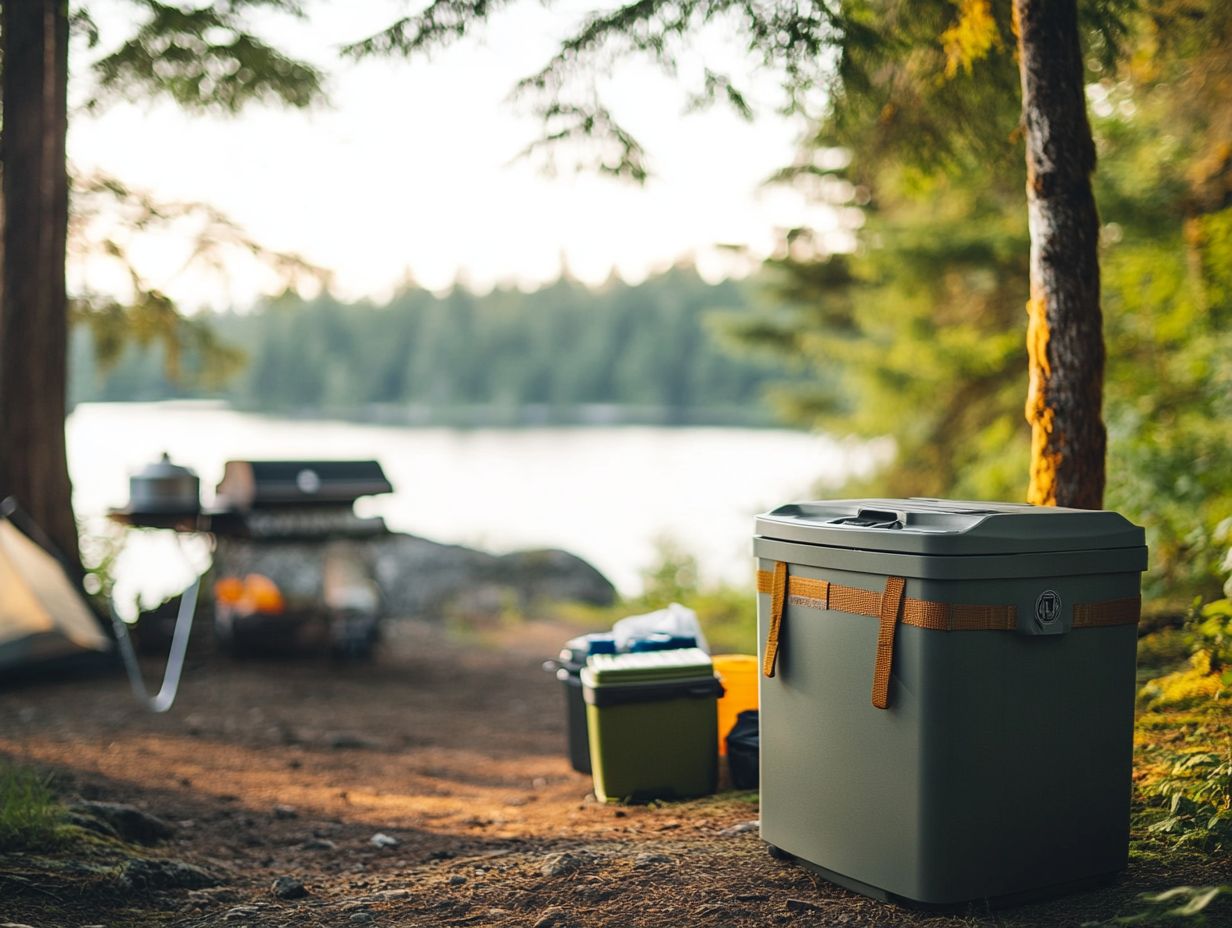
Yes, it is important to keep your food in the cooler at all times while camping. This will prevent it from spoiling and keep it at a safe temperature.
How can I keep my food from getting wet in the cooler while following camping regulations?
To keep your food from getting wet in the cooler, pack it in watertight containers or bags. You can also separate perishable items from drinks and ice to prevent water from getting into your food.
What precautions should I take to prevent food waste and spoiling while camping?
- Keep food in a cooler with plenty of ice or frozen gel packs.
- Avoid leaving food out in direct sunlight.
- Keep food away from heat sources.
Can I store food in my tent while camping, considering wildlife safety?
No, it is not recommended to store food in your tent while camping. This can attract animals and insects, putting you at risk for potential encounters. Always keep food in a secure, designated storage area.
How often should I check and replenish ice in my cooler to maintain safe food storage?
You should check and replenish ice in your cooler at least once a day, depending on the outside temperature and how frequently you open the cooler. It’s important to keep your food at a safe temperature to prevent spoilage.
Join us in making our camping sites safer and more enjoyable for everyone!

